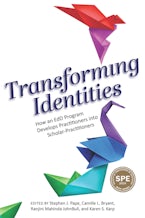Stephen Pape is professor of Education at Johns Hopkins University (JHU) where he was the founding Director of the Doctor of Education program (2013-2019). He earned his doctorate in Educational Psychology from the City University of New York. Previously, he taught middle school mathematics and science in New York City public schools and served as assistant and associate Professor of Mathematics Education at The Ohio State University and University of Florida. His research focuses on online learning environments, technology-enhanced classroom contexts that foster mathematical understanding, and the development of strategic behaviors. To support this research, he has provided professional development for mathematics and science teachers across elementary, secondary, and Community College levels for over 20 years. Funded projects include a national randomized control trial that examined the impact of classroom connectivity technology on Algebra I achievement and classroom interactions and Prime Online, an online professional development program for grades 3-5 general and special educators. He was the co-principal investigator for Florida Promise, a statewide professional development program for preK-12 science and mathematics teachers. He recently served on the Association of Mathematics Teacher Educators taskforce, Re-thinking Teaching and Learning: Unpacking Mathematics Education Online and has published over 60 peer-reviewed articles and book chapters, and conference proceedings papers.
Camile Bryant is an associate professor in the School of Education at Johns Hopkins University who teaches research methods courses. She is the former Research Methods Coordinator and Director of the Doctor of Education program. As an education research methodologist, she focuses on program evaluation, intervention research, mixed methodologies, instrument development, and approaches to support graduate students' research methods knowledge acquisition and self-efficacy. Her most recent research interest aims to (a) better understand the role of embodied pedagogy on mitigating students' research methods apprehension and anxiety, and (b) supporting students' competencies as they engage with and conduct socially responsible research.
Ranjini Mahinda JohnBull, PhD is an assistant professor at Johns Hopkins University School of Education serving as the faculty lead for the Mind, Brain, and Teaching program area and teaching in the doctoral and masters programs. Her research focuses on teacher self-efficacy, cultural competence and multicultural identity development, and arts-integration and culturally relevant neuroeducation interventions that improve teacher and student outcomes. Dr. JohnBull earned a BA from Washington University in St. Louis, an MEd and PhD in Education Leadership both from University of Virginia's School of Education and Human Development. Prior to her appointment as an assistant professor, she served as a postdoctoral research fellow at JHU SOE working on an IES-funded study of student memory in arts-integrated science classrooms. Prior to JHU, Dr. JohnBull served as a U.S. Peace Corps Volunteer in rural eastern Uganda to collaboratively support and enhance education, health, and finance projects. Before Peace Corps Uganda, she was a music teacher in two St. Louis city charter elementary and middle schools.
Karen Karp is a professor in the School of Education at Johns Hopkins University. Previously, she was a distinguished teaching professor of elementary mathematics education at the University of Louisville where she is now professor emeritus. Her scholarship focuses on the intersection of mathematics education and special education. She is the author or co-author of many book chapters, articles, and books, including the recent U.S. Department of Education Institute of Science's What Works Clearinghouse Practice Guide on Assisting Students Struggling with Mathematics: Intervention in the Elementary Grades, and other titles such as Strengths-based Teaching and Learning in Mathematics: 5 Teaching Turnarounds for Grades K-6, The Math Pact: Achieving Instructional Coherence within and Across Grades, and Elementary and Middle School Mathematics: Teaching Developmentally which has been translated into seven languages. Dr. Karp is a former member of the board of directors of the National Council of Teachers of Mathematics (NCTM) and a former president of the Association of Mathematics Teacher Educators. In 2020, she was selected for the NCTM Lifetime Achievement Award for Distinguished Service to Mathematics Education. She also is a member of the U.S. National Commission on Mathematics Instruction. She holds teaching/administrative certifications in elementary education, secondary mathematics, K-12 special education, and educational administration.

